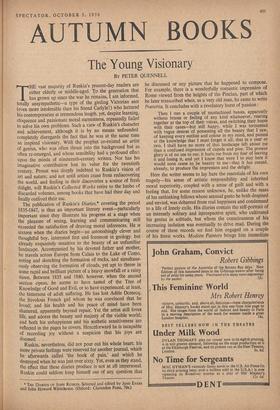AUTUMN BOOKS
The Young Visionary
BY PETER QUENNELL THE vast majority of Ruskin's present-day readers are either elderly or middle-aged. To the generation that has grown up since the war he remains, I am informed, totally unsympathetic—a type of the girding Victorian seer (even more intolerable than his friend Carlyle!) who lectured his contemporaries at tremendous length, yet, despite learning, eloquence and passionate moral earnestness, repeatedly failed to solve his own problems. Such a view of Ruskin's character and achievement, although it is by no means unfounded completely disregards the fact that he was at the same time an inspired visionary. With the prophet co-existed an artist of genius, who was often thrust into the background but as often re-emerged, and whose sensibility had a profound effect upon the minds of nineteenth-century writers. Nor has his imaginative contribution lost its value for the twentieth century. Proust was deeply indebted to Ruskin's vision of art and nature; and not until artists cease from rediscovering the world, and finding in their discoveries a source of fresh delight, will Ruskin's Collected Works retire to the limbo Of discarded volumes, among books that have had their day and finally outlived their use.
The publication of Ruskin's Diaries,* covering the period 1835-1847, is thus an important literary event—particularly important since they illustrate his progress at a stage when the pleasure of seeing, learning and communicating still exceeded the satisfaction of drawing moral inferences. He is sixteen when the diaries begin—an astonishingly clever and thoughtful boy, interested first and foremost in geology. but already exquisitely sensitive to the beauty of an unfamiliar landscape. Accompanied by his devoted father and mother, he travels across Europe from Calais to the Lake of Como, noting and sketching the formation of rocks, and simultane- ously observing the formation of clouds, yet apt to throw in some rapid and brilliant picture of a heavy snowfall or a rainy dawn. Between 1835 and 1840, however, when the second section ,opens, he seems to have tasted of the Tree of Knowledge of Good and Evil, or to have experienced, at least, the bitterness of adult suffering. He has lost Adele Domecq, the frivolous French girl whom he was convinced that he loved; and his health and his peace of mind have been shattered, apparently beyond repair. Yet the artist still loves life, and adores the beauty and majesty of the visible world; and both his unhappiness and his aesthetic sensitiveness are reflected in the pages he covers. Henceforward he is incapable of recording joy without a suspicion that his joys are doomed. . . - Ruskin, nevertheless, did not pour out his whole heart; his more private feelings were reserved for another journal, which he afterwards called 'the book of pain,' and which he destroyed when he was just over sixty. Yet, even as they stand, the effect that these diaries produce is not at all impersonal. Ruskin could seldom keep himself out of any question that * THE DIARIES OF JOHN RUSKIN. Selected and edited by Joan Evans and John Howard Whitehouse. (Oxford: Clarendon Press, 70s.) he discussed or any picture that he happened to compose. For example, there is a wonderfully romantic impression of Rome viewed from the heights of the Pincian, part of which he later transcribed when, as a very old man, he came to write Praterita. It concludes with a revelatory burst of passion : Then I met a couple of mustachioed beasts, apparently without brains or feeling of any kind whatsoever, roaring together at the top of their voices, and switching their boots with their canes—but still happy, while I was tormented with vague desires of possessing all the beauty that I saw, of keeping every outline and colour in my mind, and pained at the knowledge that I must forget it all; that in a year or two, I shall have no more of that landscape left about me than a confused impression of cupola and pine. The present glory is of no use to me; it hurts me from my fear of leaving it and losing it, and yet I know that were I to stay here it would soon cease to be beauty to me—that it has ceased, already, to produce the impression and the delight.
Here the writer seems to lay bare the essentials of his own tragedy—his sense of artistic responsibility and inherited moral superiority, coupled with a sense of guilt and with a feeling that, for some reason unknown, he, unlike the mass of his unthinking fellows whose sensual gusto he both despised and envied, was debarred from real happiness and condemned to a life of lonely exile. His diaries contain the self-portrait of an intensely solitary and irttrospective spirit, who cultivated his genius in solitude, but whom the consciousness of his increasing isolation was eventually to drive mad. During the course of these records we find him engaged on a couple of his finest works. Modern Painters brings him immediate fame; and he is laying the foundations of The Stones of Venice. His personal style is swiftly taking shape, and by the end of 1840 he has emerged as a master of English prose. Many of the passages published here deserve a place in any future anthology of English nineteenth-century prose writing. Altogether ten separate journals have been edited by Dr. Joan Evans (originally aided by the late J. H. Whitehouse), who has presented them in an attractive, yet scholarly, form, with helpful, but not over-abundant, notes. Ruskin's own delicate drawings—thirty-one altogether—have been reproduced to illustrate the narrative, besides a sprinkling of admirable pen- and-ink sketches inserted in the body of the text.



















































 Previous page
Previous page